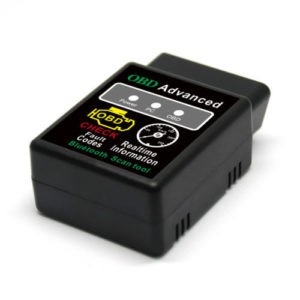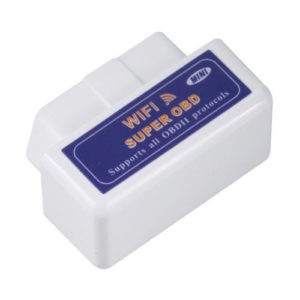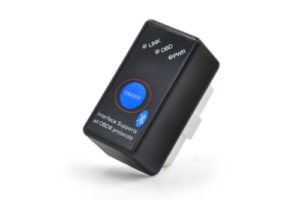For car enthusiasts and DIY mechanics, an Elm327 Obd2 adapter is an indispensable tool. It acts as the crucial bridge between your vehicle’s computer and your diagnostic software, like the Car Scanner app. Selecting the correct adapter is paramount; it dictates whether you can even connect to your car’s systems and the reliability of that connection. This guide will delve into everything you need to know to choose the best ELM327 OBD2 adapter for your needs, ensuring smooth and effective car diagnostics.
Understanding ELM327 OBD2 Adapters
When you’re in the market for an ELM327 OBD2 adapter, there are two primary considerations: compatibility and quality. First, the adapter must be compatible with your device, be it a smartphone or tablet. This largely depends on the connection type the adapter uses. Second, and equally vital, is the adapter’s quality. A high-quality adapter will reliably perform its function without glitches or data corruption, whereas a subpar one can lead to frustration and inaccurate readings.
Connection Types Explained
ELM327 adapters connect wirelessly to your devices, and they come in several connection types:
- Wi-Fi: These adapters create their own Wi-Fi network for your device to connect to.
- Bluetooth Classic (Versions 1.x, 2.x, 3.x): The traditional Bluetooth connection, widely compatible with Android devices.
- Bluetooth Low Energy (LE) (Version 4.0 and above): Designed for low power consumption, ideal for modern smartphones and essential for iOS devices.
- Bluetooth MFi: A certified type of Bluetooth classic required for seamless compatibility with Apple iPhones and iPads. These are typically more premium options due to Apple’s certification process.
- USB: While USB adapters exist, it’s important to note that they are not supported by Car Scanner software, which focuses on wireless connectivity for convenience and flexibility.
Choosing the Right Connection for Your Operating System
The operating system of your smartphone or tablet significantly influences the best connection type for your ELM327 OBD2 adapter.
Apple iOS (iPhone/iPad)
Apple’s iOS ecosystem, used in iPhones and iPads, offers support for Bluetooth LE (4.0), Wi-Fi, and Bluetooth MFi adapters. Notably, classic Bluetooth adapters (versions 1.x, 2.x, 3.x) are incompatible with iOS due to operating system limitations. This is a crucial point for iPhone users to understand to avoid purchasing incompatible devices.
Best Connection Choice for iOS: Bluetooth LE (4.0)
For iOS users, Bluetooth LE adapters strike an excellent balance. They provide a stable and straightforward connection, offer adequate data transfer speeds for diagnostic purposes, and are readily available. While Bluetooth MFi adapters offer top-tier performance and speed, they come at a higher price. Wi-Fi adapters, while compatible, can sometimes introduce connection complexities and may interfere with mobile internet access. Therefore, for most iOS users, Bluetooth LE ELM327 OBD2 adapters are the recommended choice.
Google Android
Android devices offer greater flexibility in connectivity, supporting classic Bluetooth (versions 1.x, 2.x, 3.x), Bluetooth LE (4.0), and Wi-Fi adapters.
Best Connection Choice for Android: Bluetooth Classic
For Android users, classic Bluetooth ELM327 OBD2 adapters are often the preferred option. They generally offer faster data transfer speeds compared to Bluetooth LE and are considered more reliable than Wi-Fi connections in some scenarios. A vast majority of Android users successfully utilize classic Bluetooth adapters for car diagnostics.
However, it’s worth noting a potential drawback: some Android devices might experience conflicts when multiple Bluetooth connections are active simultaneously, such as when using an OBD2 adapter and a car’s Bluetooth multimedia system.
Quality Over Version Numbers: Decoding ELM327 Adapter Quality
Forget the myths surrounding ELM327 adapter versions, internal chips, or the number of circuit boards. This information is largely irrelevant and outdated. The market is rife with misleading version numbers, and counterfeiters have become adept at mimicking superficial indicators of quality. Focusing on these outdated metrics will likely lead you astray.
Instead of chasing version numbers, understand that ELM327 OBD2 adapters essentially fall into two categories: “good” and “bad.” A “good” adapter simply works reliably, performing its intended functions without issues. Your primary goal is to identify and purchase a “good” adapter, avoiding the myriad problems associated with “bad” ones.
The Pitfalls of “Bad” ELM327 Adapters
“Bad” ELM327 adapters can manifest a range of problems that can severely hinder your diagnostic efforts and even potentially harm your vehicle’s electronic systems:
- Complete Non-Functionality: Some adapters may simply fail to work at all, unable to establish a connection or communicate with your vehicle.
- Unstable Operation: Intermittent connectivity is a common issue. Adapters might freeze, spontaneously reboot, or fail under varying environmental conditions like temperature or humidity. Inconsistency is a hallmark of bad adapters; they might work one day and fail the next, or only partially function.
- Limited Command Support: Deceptive adapters may claim to support the full range of ELM327 commands but only implement a subset. This restricts the diagnostic capabilities you can access.
- Fixed ECU Address: Some inferior adapters are hard-coded to communicate with only a standard Engine Control Unit (ECU) address, preventing access to other control units in your car, such as the ABS or transmission modules.
- Data Length Restrictions: Bad adapters may impose limitations on the length of data requests and responses, truncating crucial diagnostic information.
- Data Loss: During communication, these adapters can lose data packets. Incomplete data transmission renders the information unusable and diagnostic attempts futile.
- Data Corruption: Even worse, some adapters can distort data during transmission. Imagine sending a command to read engine temperature but the adapter corrupts it into a command to erase ECU memory – the consequences can be severe.
- Protocol Incompatibility: Adapters may only support a limited set of vehicle communication protocols. If your car uses an unsupported protocol, the adapter will be useless, even if it works perfectly on a different vehicle.
- On-Board Network Interference: Critically, faulty adapters can inject noise and junk data into your car’s communication network. This interference can disrupt the ECU’s primary function of engine control, leading to rough engine running and other performance issues.
- Coding and Service Mode Failures: For advanced procedures like ECU coding or service functions, a high-quality adapter is essential. A bad adapter will likely fail to perform these operations, and in the worst case, can write corrupted data to the ECU, potentially causing serious damage.
 Bad ELM1
Bad ELM1
The market is unfortunately saturated with these “bad” adapters, far outnumbering the reliable ones. The risk of purchasing a defective adapter is significant, highlighting the importance of informed selection.
Recommended ELM327 OBD2 Adapters: Quality Choices
To help you navigate the adapter market, here are some recommended ELM327 OBD2 adapters known for their quality and reliability. These recommendations are based on expert experience and user feedback from the Car Scanner community.
(Note: The following links are affiliate links, supporting the website through qualifying purchases.)
-
OBDLink MX+ with Bluetooth MFi: Priced around $100 USD, this is a top-tier adapter compatible with both iOS and Android. It’s the most advanced option, offering exceptional performance and features.
-
OBDLink CX with Bluetooth LE: In the $80-$100 USD range, this Bluetooth LE adapter is excellent for both iOS and Android. It boasts a large memory buffer and delivers outstanding performance.
-
vLinker MC+ with Bluetooth LE / vLinker FS with Bluetooth MFi / vLinker MS with Bluetooth MFi: vLinker devices have evolved into highly reliable options. The MC+ (Bluetooth LE) and FS/MS (Bluetooth MFi) models are particularly recommended for iOS. For Android, any vLinker adapter is a solid choice. Ensure you consider the connection type recommendations (Bluetooth for Android, Bluetooth LE for iOS) and keep an eye out for firmware updates for optimal performance.
-
Vgate iCar Pro 2S: This newer model from Vgate is an upgrade from the iCar Pro BLE, offering improved performance and reliability. It’s a worthwhile option if you are considering the iCar Pro series.
-
Vgate iCar Pro BLE: This adapter is compatible with iOS, Android, and Windows due to its Bluetooth 2.0 + Bluetooth 4.0 chip. If you own an older version, ensure you update the firmware (version 4.1.02 or later) to address potential issues with CAN Extended addressing, especially relevant for Toyota and BMW vehicles. Firmware updates can be downloaded from the manufacturer’s website.
ELM327 OBD2 Adapters to Avoid: Steer Clear Of These
To minimize the risk of purchasing a “bad” ELM327 OBD2 adapter, avoid these categories and brands:
- xTool Adapters: These are not ELM327 compatible and are designed exclusively for xTool’s proprietary software.
- Wired Adapters (USB, COM): Car Scanner exclusively supports wireless adapters, so USB or COM port adapters are incompatible.
- “Mini” Adapters: Adapters marketed with “mini” in their name have an exceptionally high chance (99%) of being low-quality.
- Extremely Cheap Adapters: Unrealistically low prices are a major red flag. Quality components and reliable manufacturing come at a cost.
- Adapters with Specific Bluetooth MAC Addresses: Avoid adapters with Bluetooth MAC addresses starting with
11:22:33and00:00:00, as these are often associated with low-quality clones. - KONNWEI Devices: While previously recommended, KONNWEI adapters have experienced a decline in quality and are now prone to data packet loss.
- “Micro Mechanic” Adapters: Many users report these adapters failing after a short period of use.
- “THINMI.COM” Adapters: These offer limited ELM327 command support and are known to generate fake responses.
- KUULAA Brand Adapters: Adapters from this brand are generally not recommended due to quality concerns.
- Adapters with This Specific Design: While visually similar adapters might be technically compatible, those with the following designs are overwhelmingly reported to be of very low quality:
 Bad ELM3
Bad ELM3 Bad ELM4
Bad ELM4 Bad ELM5
Bad ELM5
Conclusion: Choosing Wisely for Reliable Diagnostics
Selecting the right ELM327 OBD2 adapter is crucial for effective and safe car diagnostics. By understanding the connection types, prioritizing quality over misleading version numbers, and heeding the recommendations and warnings outlined in this guide, you can significantly increase your chances of choosing a reliable adapter. Investing in a quality ELM327 OBD2 adapter ensures a smoother diagnostic experience and protects your vehicle’s sensitive electronic systems. Happy diagnosing!